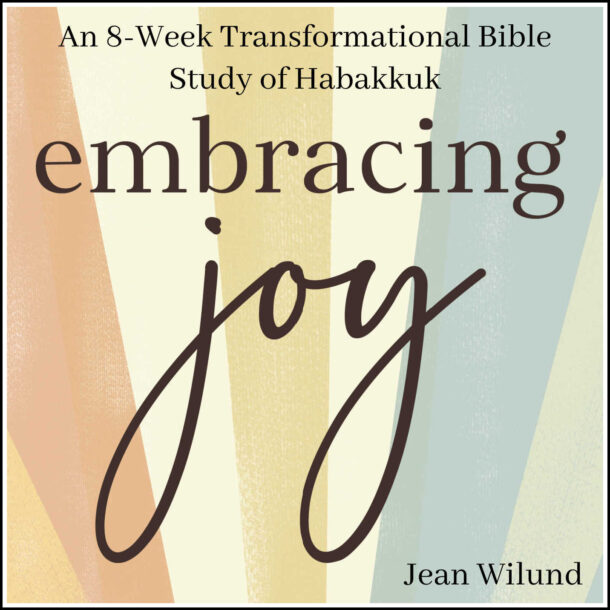The following is a transcript of the video above.
Genesis 5 (Pt. 3) Escape from Judgment: The Collision of God’s Law and Love
Judgment is what makes death such a big deal.
If we all die and go to heaven, then why care about death? Except, well, maybe the painful moment of death if we don’t go peacefully in our sleep.
But other than that, death is really just a matter of timing. Who gets to heaven first.
But we do not all die and go to heaven because God judges sin. He must.
And we are all sinners. If you’re like me, you want to know how to escape judgment maybe even more than death. I’m Jean Wilund and this is Genesis 5—Escape from Judgment.
No Do-Overs on Judgment Day
If God finds us guilty, the gates of heaven will not open for us. When we stand before Christ on Judgment Day, there will be no second chances. No do-overs.
God gave Enoch a vivid picture of that day.
We have to flip to the back of the Bible to Jude to read what Enoch saw, starting in verse 14.
“It was also about these men that Enoch, in the seventh generation from Adam, prophesied, saying ‘Behold the Lord came with many thousands of His holy ones to execute judgment upon all.'”
Did you get that?
“To execute judgment upon all.”
Jesus—the Righteous Judge—Must Judge Sin
The first time Jesus came, He came as the humble suffering servant. A gentle Savior. The lamb of God.
But when He returns, He is coming as the Righteous Judge to execute judgment upon all.
God does not delight in the death of sinners. He delights in salvation, but He is pure, and He is holy. He cannot endure sin. He must judge it.
If we saw sin as it truly is, we would demand it be judged too—even in those we love most. So I praise God for His mercy because we need mercy!
Pastor John MacArthur told a story I heard that he got from a friend of his, Fred Barshaw. This story paints a vivid picture of the dilemma of God’s judgment and His mercy colliding.
Caught Between Love and the Law
In the days when tribes roamed Russia, a certain tribal leader ruled supreme. He controlled the best land because no other leader was as wise or physically powerful as he was.
And his laws were just and fair. He had laws such as: Children must love and honor their parents, and Stealing was to be severely punished.
The tribe enjoyed peace and prosperity under his rule until someone began to steal.
The leader made a proclamation: “When the thief was caught, he would receive ten lashes from the tribal whip master!”
But the stealing continued.
So the leader raised the punishment to 20 lashes.
But the thief didn’t stop.
So he raised it to 30 lashes, and then finally to 40 lashes.
No one—no one—could survive 40 lashes except him because no one else had the physical strength he possessed.
Finally, the thief was caught.
It was the leader’s own mother.
Shock waves ripped through the tribe. What would he do?
He demanded that everyone must, in everything, honor their parents. He must love and honor his mother. But the law demanded that theft be punished with 40 lashes. What would he do?
Would he satisfy his demand for love and save his mother? Or satisfy his demand for punishment because of the law? Would he watch her die under the whip?
Judgment day came, and the tribe gathered together around the judgment seat and this large post in the ground.
And with reverence and ceremony, the leader marched in, and he entered, and he sat down on the judgment seat. Every eye watched as towering warriors led the leader’s frail mother up to the post and tied her to it.
The crowd began to murmur. Some swore he would satisfy his love at the expense of his law. Others said he must satisfy his law, even at the expense of his love.
The whip master entered last, and he had a cruel whip in his hand. And as he stepped toward the fragile mother, the warriors ripped her shirt and exposed her delicate back. The crowd gasped as the whip master cracked his ferocious practice swing.
The leader—her son—sat on his throne, silent before her. And every heart beat this question: Which would he allow to be violated? His love? Or his law?
The whip master raised his powerful arm for the first cutting stroke. But the leader lifted his hand. And the crowd sighed relief. He chose love over his law.
Then the leader rose from his throne, and as he walked towards his mother, he removed his own shirt, and he tossed it to the side.
When he reached her trembling body, he wrapped his thick arms around her, and he stood over her as a shield. And with his back bared toward the whip master, he said, “Proceed with the punishment!”
And thus, the great leader satisfied both his law and his love.
Jesus—Our Shield, Our Defender, and Our Righteousness
This is the type of Savior that we have in Jesus.
We are all guilty sinners—as guilty as the line of Cain and the line of Seth. Our genealogies are filled with nothing but sinners.
Every one of us has sinned against our great and holy God, and we deserve the death sentence. We deserve it, but Jesus rose up from His throne in heaven, and He stepped down to earth. And He hung on the cross to take our punishment upon Himself.
He is our shield, and our defender, and our righteousness.
God made Jesus, who knew no sin, to be sin on our behalf, so that we might become the righteousness of God in Him.
No Judgement for Righteousness
There is no judgment for righteousness. None! Our merciful and holy God judged our sin in His Son so that we can escape judgment.
And if you truly believe that Jesus took your place on the cross, and you turn away from your sin—the sins that placed Him there—you will be saved. You will escape judgment for your sins.
But if you continue to cling to your sins, and you continue to reject Christ’s sacrifice on the cross, know this for sure: Jesus is coming again, and He is coming as the Righteous Judge with many thousands of His holy ones to execute judgment on all.
Jesus is the way, the truth, and the life.
John 14:6
Will you by faith step into eternal life today and escape the judgment for your sin forever?
In the next video, I’m going to share three ways that God transforms our hearts and minds if we believe and act on what He has revealed to us in Genesis 5. I’ll see you then! Thank you!
Bible Study (and Genesis) Resources
- If you’re new to the Genesis series, start here: Help Me Study Genesis






